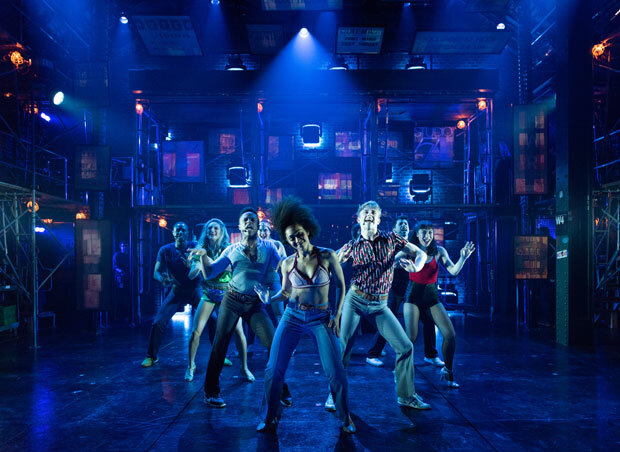This Ain't No Disco
The lanky man in the blonde wig has the right idea. The lights in the club are suitably dim, but he keeps his sunglasses on for almost his entire time onstage. Audience members at This Ain’t No Disco, the sprawling rock opera making its world premiere Off-Broadway at the Linda Gross Theatre at Atlantic Stage Company, would be wise to follow suit.
Despite a top-notch creative team and an undeniably talented cast, viewing this musical requires a protective sheen for one’s vision. The production is too bright, too loud and too long — all of which, perhaps, are an attempt to hide the lack of substance in this story of the end of Studio 54 and the emergence of the Mudd Club.
It’s a surprising disappointment, given the sizeable talent that makes up the creative team, which includes music and lyrics by Stephen Trask (Hedwig and the Angry Inch) and Peter Yanowitz (from band The Wallflowers) and a book that credits the composers and Rick Elice, who penned the book for the hit musical Jersey Boys. At the helm is Darko Tresnjak, who gave the zany humor of A Gentleman’s Guide to Love and Murder a wonderfully light touch.
Perhaps the team’s lack of restraint was deliberate? Dizzying excess could be a fitting way in which to pay tribute to Studio 54, the infamous nightclub where the rich and beautiful went to drink, do drugs and dance in hedonistic delight. But the connection between the subject of the musical and the material onstage is simply not there. Instead, an overambitious story of an assorted collection of cliched characters is set to song, with little emotion to inspire the audience’s investment.
The two most prominent characters are Chad (Peter LaPrade), a former hustler working at the club, and Sammy (Samantha Marie Ware), a single mom and aspiring singer whose self-declared punk style includes a jaunty hat. The two are thrust into their 15 minutes of fame, Chad being recruited by the calculating PR rep Binky (Chillina Kennedy) who repurposes him as rebellious graffiti artist Rake and Sammy by The Artist himself (obviously inspired by Andy Warhol) into a glittering diva singer, but – in no surprise at all, there are prices to pay in their rise to the top. Shocking, I know.
There’s also Steve Rubell, the real-life owner of the club, played by Theo Stockman, aspiring artists and lovers who work the club’s coat-check Meesh (Krystina Alabado) and Landa (Lulu Fall), a gay district attorney who works to shut the club down (Eddie Cooper), and The Artist (Will Connolly), a deadpan figure lurking stiffly in the dark corners before making stony-faced statements such as, “I rather like the hat.”
There are simply too many characters to keep track of, let alone care about, and, as a result, far too many songs are packed into the show’s two-and-a-half hours. None of the characters have the opportunity to fully develop: despite strong performances by LaPrade and Ware, Chad is sweet, cute and bland; Sammy’s guilt at leaving her son at home is passed over too quickly to register as anguish that drives her to addiction. Rubell’s maniac joy borders on caricature and Meesh and Landa’s relationship is very sweet but little else.
The music does little to help, the series of songs performed so quickly they blend into one another and whose lyrics are often drowned out by the band. One standout is "I’m Not Done Yet," Binky’s defiant anthem of reinvention in which she declares, “I’ve been suffragette, a secretary and Rockette.” But too few of the songs actually advance the plot or the characters and feel perfunctory.
This does no favors for the male characters, nor does it assist the female ones. In this jam-packed cast, three of the primary characters are women, and each of them fulfills a disappointing stereotype: a woman so racked with guilt over being a working mother that she succumbs to drugs, a nurturing lover who is apparently nothing but a happy, free-spirited artist and an ambitious woman who ruthlessly destroys a naïve young man’s life to advance her career. Studio 54 closed in 1980, when the Second Wave feminist movement had been in full swing for quite some time. It's disappointing to see women portrayed as either nurturing or narcissistic, with nothing in between.
The choreography doesn’t fare any better; the organic joy Camille A. Brown brought to last season’s revival of Once on This Island is nowhere to be seen as the lithe cast repeatedly bumps, grinds and gyrates. This confusing chaos seen onstage exists in jarring contrast with the musical's conclusion, a gently domestic portrait of peaceful content as the cast croons, “We just make it up as we go along.” Apparently, so did this musical’s writers.

